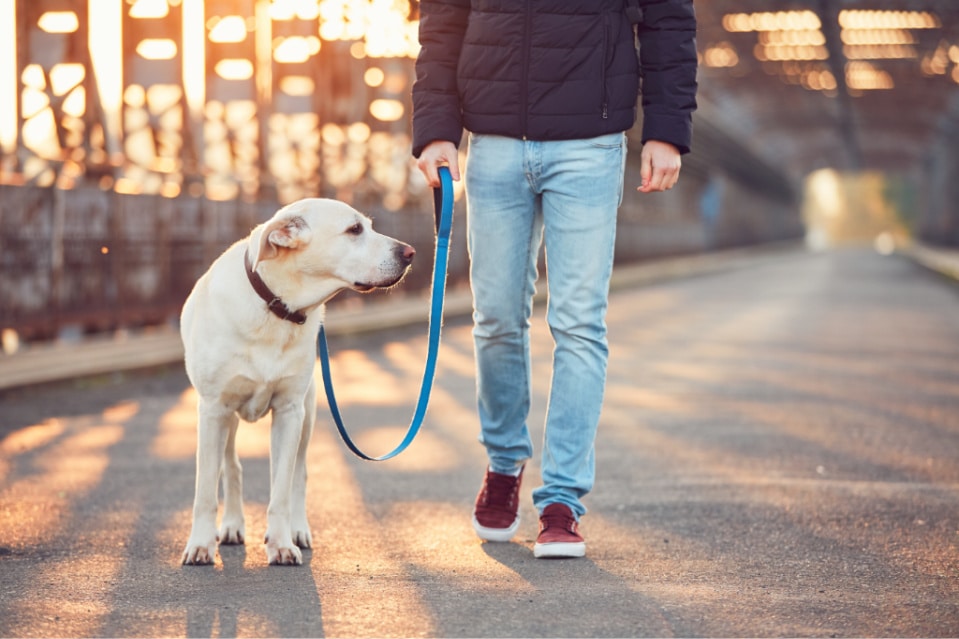Do you want to know when do Labs slow down?
Check out this article to learn when do Labs slow down, what Labrador Retrievers are like when they turn adults, and much more!
When do Labs slow down?
The long and short of it is that Labradors usually slow down when they become adults.
Labradors physically mature when they are around 18-24 months old. They reach their adult height when they are 6-12 months old, but they usually continue to fill out until about 2 years old.
Take note, however, that while Labrador Retrievers may only start to slow down at around that age, they will likely still act a lot like puppies.
That is because Labradors mentally mature when they are 2-4 years old. Most Labs will become very calm and behaved when they are 5 years old, especially if they were properly trained.
But, until then, you will have a very high-energy and curious Labrador. It is completely normal for your Labrador Retriever to act that way, and it is likely they will engage in slightly naughty behavior like nipping, chewing, and digging.
Therefore, you need to train your Lab to teach them how to behave while they are young. That way, they could potentially mature and slow down faster.
What are senior Labradors like?
Labradors start to seriously calm down when they are seniors. They will not have as much energy in their old age, and they will need special care.
However, they still need exercise to stay healthy. Labradors are susceptible to obesity, joint problems, arthritis, especially when they are old.
Do adult Labradors slow down?
Once Labradors become mentally mature, they will be very patient and loving dogs.
They have very low aggression levels, which makes them excellent additions for homes with children. They adore their families and can also make great watchdogs.
However, Labradors can still be very energetic as adults. They may not be as spunky as a puppy, but they will definitely still want to run and play.
Most adult Labradors will want at least 1-2 hours of physical activity a day. However, more “relaxed” Labs may prefer 45-60 minutes of exercise.
It is important they do enough physical activity, especially if you want to have a calmer Labrador.
Labs will get hyper and destructive if they lack exercise. They will find other ways to release their extra energy, like chewing up your furniture and shoes, even when they are adults.
What if my Labrador does not slow down as an adult?
As stated earlier, Labradors still have lots of energy as adults because they are working dogs.
Your dog will be calmer as an adult, but they may still have lots of energy that they need to use.
Luckily, it is easy to avoid that. Enough exercise daily can keep their destructive and hyper behavior at bay.
Here are some ways to make sure your dog does enough physical activity:
- Long walks and jogs (2-4 times a day)
- Playing fetch
- Throw a frisbee and make your Lab catch and retrieve it
- Tug of war (play gently to avoid damaging your dog’s mouth and to prevent encouraging aggression)
- Encourage them to chase you
- Swimming when your Labrador is at least 3-5 months old (in shallow waters for beginners)
However, Labs are also smart dogs, which means they will get bored easily and will look for ways to keep themselves entertained.
A bored Labrador will engage in naughty behavior like digging, running around your house, and chewing.
You can make sure your Lab stays entertained by leaving them lots of different toys.
That way, they can pick them up and play whenever they feel bored. You can also give them a puzzle toy like a KONG dog toy so they will be busy for a while.
Special exercise tips for senior Labradors
So, when your Labs do slow down, here are some tips to help keep them in tip-top shape:
1) Frequent and short walks

Puppies and adult Labs can easily walk or jog for 30-60 minutes up to two times a day without breaking a sweat.
Senior Labradors do not have the same strength and will tire much easily.
However, that does not mean your Labrador should stop moving. Instead, you can walk them for shorter periods of time to keep them moving. You can walk them for 10-15 minutes instead.
Additionally, you can walk them several times a day. Accompanying your senior Labrador for ten-minute to fifteen-minute walks twice to four times a day is a great way to keep them strong and happy.
Frequent, short walks will encourage them to move, which can easily prevent issues like arthritis. It also helps them stay trim since senior dogs tend to gain weight easily.
2) Low-impact activities
Your dog can still exercise and have fun despite their age by choosing low-impact activities.
For instance, since Labradors love to swim, swimming is a wonderful low-impact sport that they can try.
Swimming is gentle on your dog’s joints, but it will help them use their energy and stay active.
If your senior Lab is on the heavier side, you can get an underwater treadmill. The water helps your Labrador jog without putting too much pressure on their joints. The water will also add more resistance to your dog’s workout.
3) Puzzle toys
Puzzle toys encourage your Labrador to move around a bit and also engage your Lab’s brain.
For instance, fun puzzle toys like KONG toys make your dog move around the toy so they can get delicious treats. It also keeps them busy and entertained if you are busy.
If you want a slightly harder challenge for your senior dog, you can make them find treats.
One way you can have them do this is by making them use their nose to hunt for yummy treats. This game will not only encourage them to move around; it will also help them keep their senses and mind active.
Get 5-6 boxes of different sizes. Show your senior dog the treat and let them smell it.
Put the treat in one box then move the boxes around. The goal is to let your dog smell the boxes until he finds the treat!
In conclusion
So, when do Labradors slow down?
Labradors often slow down when they are 2-4 years old. They will usually be calmer if they get enough exercise. They become much calmer when they are seniors.







